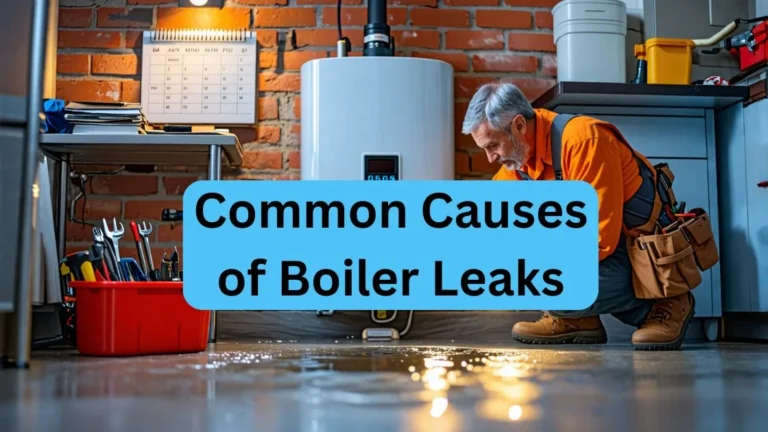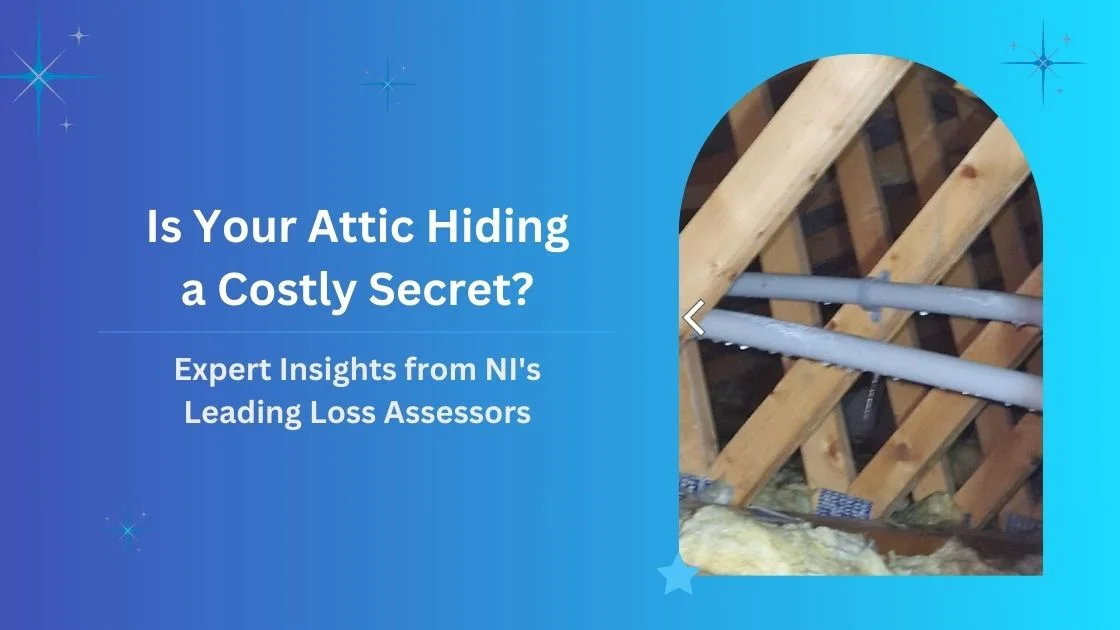A leaking boiler can disrupt your daily routine and lead to costly repairs if left unchecked. In this post, we’ll reveal the common causes of boiler leaks and share effective prevention strategies to help you maintain a safe and efficient heating system.
- Dealing with a boiler leak is vital for maintaining property safety and preventing costly damage. Common causes include high pressure, corrosion due to age, and improper installation.
- Identifying signs such as damp patches or unusual noises can help address leaks early. Immediate actions include turning off the water supply and using containers to catch any leaking water.
- Preventative maintenance, such as annual servicing and pressure checks, can significantly reduce risks. Understanding the financial implications and ensuring adequate insurance coverage are essential steps for homeowners.
Importance of Addressing Boiler Leaks
Addressing boiler leaks is crucial not only for the preservation of the property but also for the safety of its occupants. A leaking boiler can lead to severe water damage, resulting in structural issues and encouraging the growth of harmful mould and fungi.
Such conditions jeopardise both health and property, making prompt intervention indispensable. Ignoring these leaks can escalate into life-threatening scenarios, including gas leaks and potential carbon monoxide poisoning, underscoring the importance of boiler safety.
Regular monitoring for signs of leaks, such as damp patches or unusual noises, can prevent costly repairs and ensure a secure living environment. Proactive maintenance and swift responses to leaks are essential in mitigating risks and promoting a sense of community well-being.
Signs of a Boiler Leak
Identifying the signs of a boiler leak is critical for maintaining both safety and efficiency within a property. Recognising these indicators early can prevent more significant issues down the line. Pay attention to the following signs:
Regular damp detection can help ensure your boiler remains safe and efficient.
Common Causes of Boiler Leaks
Understanding the common causes of boiler leaks is essential for effective prevention.
High pressure issues, particularly above 2 bars, can lead to leaks from pressure relief valves, while corrosion in older systems often exacerbates vulnerabilities.
Furthermore, improper installation can create weak points in joints and fittings, highlighting the necessity for professional expertise in boiler installation.
High Pressure Issues
Maintaining proper boiler pressure is essential for preventing leaks, as excessive internal pressure can lead to significant issues within the system.
Ideally, boiler pressure should be kept between 1.2 and 1.5 bar. When pressure exceeds 2 bars, leaks can occur, particularly from the pressure relief valve.
To ensure a well-functioning boiler, consider the following:
- Regularly check the pressure gauge; a needle in the red zone indicates a critical situation requiring immediate action.
- Bleed radiators to alleviate pressure and release trapped air, preventing potential leaks.
- Schedule routine maintenance checks to identify weak points susceptible to pressure-induced leaks.
You can also try these other boiler pressure loss solutions.
Corrosion and Age
Many homeowners may not realise that corrosion plays a critical role in the deterioration of boiler systems, especially in units that have been in operation for 10 to 15 years.
Prolonged exposure to water and oxygen accelerates corrosion, leading to leaks that can compromise the entire system. Furthermore, metallic debris in the water can exacerbate this issue, weakening pipe fittings and increasing the likelihood of failure.
The age of a boiler greatly influences its vulnerability, as wear and tear can lead to compromised seals and joints.
To guarantee effective corrosion prevention, regular inspections and maintenance are essential. For older systems, investing in a new boiler can enhance longevity and minimise leak risks, as modern units employ advanced materials designed to withstand corrosion better.
Improper Installation Risks
Corrosion is not the only factor that can lead to boiler leaks; improper installation poses considerable risks as well. Adhering to installation standards is vital, as failure to do so can result in severe consequences.
Common causes of leaks due to improper installation include:
- Misalignment of pipes, leading to pressure issues and eventual leaks.
- Loose joints that develop from temperature fluctuations, often due to inadequate tightening.
- Faulty heat exchangers resulting from poor installation practices, leading to substantial water loss.
To mitigate these risks, it is essential to engage certified technicians for installation. Their expertise ensures that proper protocols are followed, significantly reducing the likelihood of leaks.
Regular maintenance checks post-installation further safeguard against potential issues.
Immediate Actions to Take
When a boiler leak is detected, swift action is essential to mitigate potential damage and ensure safety.
Begin your emergency response by immediately switching off the water supply and central heating to prevent further water damage. Place buckets or containers beneath the leak to collect dripping water, minimising its impact on your home.
If you suspect a gas leak, turn off the gas supply and evacuate the premises, reaching out to a Gas Safe registered engineer for inspection and repairs.
Promptly clean any water spills to hinder mould growth and avoid structural damage.
Ultimately, document the leak’s location and severity, along with actions taken, to facilitate effective leak management and provide vital information to the professional upon their arrival.
Preventative Maintenance Strategies
Preventing boiler leaks requires a proactive approach that emphasises regular maintenance and timely interventions.
By adopting effective preventative strategies, homeowners can ensure their systems operate efficiently and safely. Learn how to manage central heating leaks.
Consider implementing these essential practices:
- Annual Servicing: Schedule yearly inspections with a certified Gas Safe registered engineer to identify potential issues early and guarantee optimum boiler performance.
- Chemical Power Flushing: Remove sludge and debris build-up to combat corrosion, ultimately leading to significant efficiency improvements and an extended boiler lifespan.
- Magnetic Filters: Install these filters to capture metallic debris, reducing the risks of corrosion and enhancing overall performance.
Additionally, regularly inspect pipework and maintain a documentation log of all maintenance activities.
These proactive measures will foster a sense of community and shared responsibility among homeowners.
Financial Implications of Boiler Repairs
The financial implications of boiler repairs depend significantly on the choice between repairing an ageing unit or investing in a new, energy-efficient model.
While repair costs can vary considerably, the long-term savings from reduced energy bills and enhanced efficiency often make replacement a more appealing option.
Additionally, understanding insurance coverage for water damage and exploring boiler cover plans can offer crucial financial protection against unforeseen repair costs.
Repair Vs. Replacement Costs
Deciding between repairing or replacing a leaking boiler involves careful financial consideration, as the costs can vary significantly based on the severity of the issue.
Homeowners should weigh the following factors:
- Repair Benefits: Average repair costs range from £150 to £400, making it a cost-effective initial solution for minor issues.
- Replacement Drawbacks: Full boiler replacement can cost between £2,000 and £4,500, which can greatly impact your budget.
- Long-Term Efficiency: Older boilers (10-15 years) may justify replacement for enhanced efficiency, potentially saving up to £300 annually on energy bills.
Regular maintenance can prevent costly repairs, emphasising the importance of evaluating your boiler’s age and condition when making this vital decision.
Prioritise both immediate and future financial implications for informed choices.
Insurance Coverage Importance
Understanding the nuances of insurance coverage is vital for homeowners facing potential boiler leaks, as inadequate policies can lead to significant financial repercussions.
Many standard insurance types may not encompass all water damage scenarios, leaving homeowners vulnerable to unexpected costs. Repair estimates can vary dramatically, often ranging from hundreds to thousands of pounds, making it important to know your coverage limits.
Furthermore, the average boiler replacement can exceed £3,000, further emphasising the need for comprehensive insurance. Investing in a boiler cover plan can provide peace of mind, covering both emergency repairs and routine servicing.
Homeowners must review their policies diligently to ensure they are protected against potential property damage, such as mould remediation, which often falls outside standard coverage.
Legal and Safety Considerations
In the realm of boiler maintenance, legal and safety considerations are of utmost importance to ensure both compliance and protection for homeowners.
Adhering to regulatory standards not only ensures the safety of your property but also promotes a sense of security within the community.
Key components include:
- Annual safety inspections carried out by Gas Safe registered engineers to verify the integrity of gas appliances.
- Gas Safety Certificates issued following inspections, essential for landlords to maintain accurate records and ensure tenant safety.
- Installation of carbon monoxide detectors to provide early warnings against potential poisoning, thereby safeguarding vulnerable occupants.
Long-Term Boiler Performance Tips
Maintaining optimal boiler performance is crucial for ensuring efficiency and longevity, ultimately preventing costly leaks and repairs.
To achieve peak boiler efficiency, schedule regular annual maintenance with a certified Gas Safe registered engineer. This proactive approach not only identifies potential issues before they escalate but also extends your boiler’s lifespan.
Furthermore, consider a chemical power flush every few years to remove sludge and limescale build-up, which can hinder performance. Installing a magnetic filter further safeguards your system by capturing metallic debris that can lead to corrosion.
Monitor your boiler’s pressure gauge, keeping it between 1.2 and 1.5 bar to avoid excessive pressure risks.
Lastly, maintain a detailed maintenance log to track service history and address recurring problems efficiently.
Key Takeaways
- Identify signs of leaks such as damp patches, puddles, and unusual noises to address issues promptly.
- Maintain boiler pressure between 1.2 and 1.5 bar to prevent leaks caused by high pressure.
- Schedule annual servicing and inspections with certified engineers to ensure proper boiler operation and detect potential problems early.
- Implement preventative measures like chemical flushing and installing magnetic filters to reduce corrosion and sludge build-up.
- Understand your insurance coverage for water damage to protect against unexpected repair costs related to boiler leaks.
Boiler Leaking? Don’t Freak—Your Local Experts Are Here to Help!
Don’t let a boiler leak spiral into a costly nightmare. Our professional leak detection service across Northern Ireland is ready to fix the issue swiftly and efficiently. Call us now for immediate assistance and safeguard your home today!



